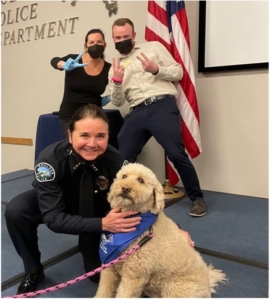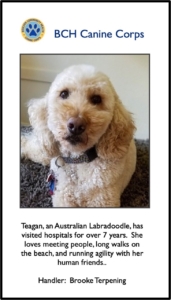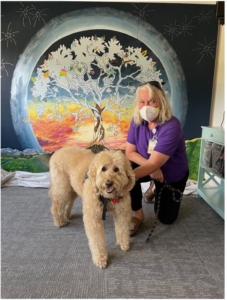by Sparkle Abbey
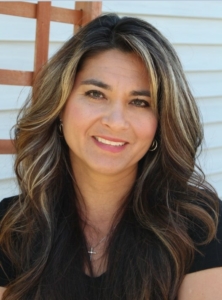 Today we’re thrilled to have a special guest stop by, friend and fellow author, Sharee Stover!
Today we’re thrilled to have a special guest stop by, friend and fellow author, Sharee Stover!
We have some questions for you but before we dive into those, please tell our blog visitors a little bit about yourself.
Hi all! I’m extremely grateful to be joining you today. I’m a Colorado native transplanted to the Midwest. I joke that I was dragged down Interstate 80 by law enforcement. All true, since my husband was a Lieutenant for the State Patrol, (now retired). In all seriousness, I came willingly for the sake of love to live out my very own happily ever after with him and have never looked back. We have three amazing kids and a brand-new grandbaby. I write full-time alongside our newly rescued German Shepherd, Maverick. My husband and I love the outdoors. We enjoy long daily walks with Maverick as well as regular weekly runs together. In fact, we just completed our first family 5k run! It was a blast. Our youngest daughter plays violin in the youth symphony, so we spend a lot of time driving to and from those rehearsals and practices. Downtime for me includes crocheting and of course, reading (although I love audiobooks and true crime podcasts as well).
And now to our questions.
What started you on your writing journey?
I initially began writing with the intention of documenting my mother’s life story. She is a South Korean war bride, and her story is incredible. After ten years, I’m still working on the book, and I promise myself regularly that I really will finish it someday soon. However, the shift from non-fiction to fiction came after I attended a fiction writers bootcamp about fourteen years ago. I learned a ton and it started me on my journey to hone and write fiction.
What do you write? And why did you choose that genre or sub-genre?
I read mysteries, suspense, and romantic suspense so the transition to writing those genres was natural for me. I love the intensity of a deep who-done-it mystery, combined with nail-biting suspense, and the thrill of falling in love. I write heavy on the suspense because it’s my favorite component. I believe in keeping my stories authentic, especially in regard to police procedures. Having my own subject matter expert at home is a huge benefit. Solving a crime, investigating the case, and taking down the villain are my favorite parts of the story. Add in romance with a hunky hero, and it just doesn’t get better than that.
What’s your favorite part of writing?
Writing is my dream come true and I try to never take for granted the joy of doing it. Even on the hardest days. Brainstorming ideas is so much fun because it’s a blank slate to create characters, drop in clues to the mystery, solve the crime, and develop the hero and heroine’s personalities. If ideas just present themselves without my having to hunt them down or research for them, that’s even better. I enjoy editing because I at least have words to work with and expand on. I love writing about brilliant dogs who help solve the case too!
And what’s your least favorite part of writing?
By comparison, the final edits are a double-edged sword because it’s time consuming and can be frustrating. Especially if my weasel words are taking over the page and I’m having to kill them repeatedly.
How much do you plan before you start a book?
I am a plotter to the max because I need a detailed synopsis to keep me on track as I write. I spend several weeks creating that, as well as deep character development before I ever start writing the story. I require a solid mental visual of the story and characters that translate on to the page. I use programs like One Stop for Writers as well as a physical storyboard with sticky notes to plot out scenes and chapters. I also enjoy research which includes field trips to locations for my books and talking to experts like forensic specialists.
Where do your very best ideas come from?
True crime stories or forensic developments give me the best ideas. For me, the story almost always begins with the crime.
What part of writing is the most difficult for you to write? Characters? Conflict? Emotion? Something else?
Ugh. Conflict is a constant battle for me, especially in romance. Keeping the suspense high while establishing a strong reason for why the characters cannot be together that will sustain the story is tough.
What’s next? Tell us about your next book and when it will be published.
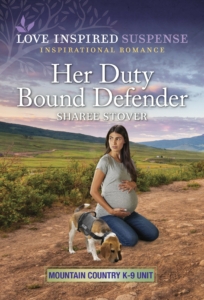 My current release is Her Duty Bound Defender, and it’s book two in the Mountain Country K-9 series. Here’s the back cover blurb.
My current release is Her Duty Bound Defender, and it’s book two in the Mountain Country K-9 series. Here’s the back cover blurb.
Threatened and falsely accused…She’ll need this K-9’s protection.
Only seconds after widowed mother-to-be Naomi Carr-Cavanaugh is rescued from two masked gunmen, she’s accused of multiple murders. Detective Bennett Ford believes he’s finally apprehended the Rocky Mountain Killer—until Naomi is attacked again. Now she must rely on Bennett and his K-9 partner for protection. But with threats closing in, she’ll have to prove her innocence first in order to stay alive…
The Mountain Country K-9 series is comprised of ten Love Inspired Suspense authors working on a continuity story while also developing each individual book. It’s a great exercise in cooperating with other authors as we must keep communication a priority to sync the storyline and characters. The book released on April 23, 2024 in print, ebook, and audiobook.
Up next is the second book in my Heartland Fugitive Task Force series, Guarded by the Marshal, releases September 24, 2024. Here’s the back cover blurb: 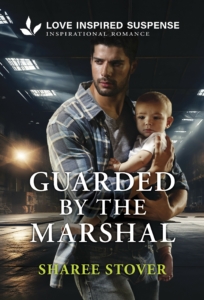
Tracking a fugitive…and shielding an infant.
When police chief Dani Fontaine gets an emergency call, she never expects to be ambushed by gunfire—or to find her friend’s abandoned baby. Now Dani must keep the child safe, while evading assailants and investigating a leak in her department. And that means working with Deputy US Marshal Beckham Walsh, the man who almost destroyed her career. Protecting a child while searching for stolen weapons becomes more perilous at every turn. And with a target on their backs and multiple suspects, it could be their deadliest mission yet…
The cover is amazing with a super hunky hero. Who doesn’t love that? The story is about the Heartland Fugitive Task Force commander Deputy US Marshal Beckham Walsh reuniting with his first love, chief of police, Danielle Fontaine. They’re pitted against each other with Dani defending her evidence technician accused of stealing Beckham’s case evidence. And of course, there’s a brilliant canine included in the story.
Here’s a bit more about Sharee’s background:
 Colorado native Sharee Stover lives in the Midwest with her real-life-hero husband, three too-good-to-be-true children, and a ridiculously spoiled dog. A self-proclaimed word nerd, she loves the power of the written word to ignite, transform, and restore. She writes Christian romantic suspense combining heart-racing, nail-biting suspense, and the delight of falling in love all in one. She is a member of Mystery Writers of America, American Christian Fiction Writers, and Sisters in Crime. Sharee is a triple Daphne du Maurier finalist, winner of the 2017 Wisconsin Fabulous Five Silver Quill Award, and her debut, Secret Past, won Best First Book in the 2019 National Excellence in Romance Fiction Awards. She is also a Publisher’s Weekly Best Selling author. When she isn’t writing, Sharee enjoys reading, crocheting and long walks with her obnoxiously lovable German Shepherd. Visit her at www.shareestover.com.
Colorado native Sharee Stover lives in the Midwest with her real-life-hero husband, three too-good-to-be-true children, and a ridiculously spoiled dog. A self-proclaimed word nerd, she loves the power of the written word to ignite, transform, and restore. She writes Christian romantic suspense combining heart-racing, nail-biting suspense, and the delight of falling in love all in one. She is a member of Mystery Writers of America, American Christian Fiction Writers, and Sisters in Crime. Sharee is a triple Daphne du Maurier finalist, winner of the 2017 Wisconsin Fabulous Five Silver Quill Award, and her debut, Secret Past, won Best First Book in the 2019 National Excellence in Romance Fiction Awards. She is also a Publisher’s Weekly Best Selling author. When she isn’t writing, Sharee enjoys reading, crocheting and long walks with her obnoxiously lovable German Shepherd. Visit her at www.shareestover.com.
Thanks for visiting The Stiletto Gang, Sharee!
If you’d like to find out more about what Sharee is up to next, here are links to join her newsletter and how to find her on social media:
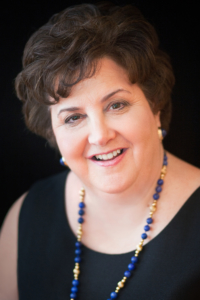 Thanks to the Fire Department! by Debra H. Goldstein
Thanks to the Fire Department! by Debra H. Goldstein

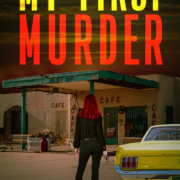
 HERE IS MY RAMBLE OF THE MONTH:
HERE IS MY RAMBLE OF THE MONTH:
 Today we’re thrilled to have a special guest stop by, friend and fellow author,
Today we’re thrilled to have a special guest stop by, friend and fellow author,  My current release is Her Duty Bound Defender, and it’s book two in the Mountain Country K-9 series. Here’s the back cover blurb.
My current release is Her Duty Bound Defender, and it’s book two in the Mountain Country K-9 series. Here’s the back cover blurb.
 Colorado native Sharee Stover lives in the Midwest with her real-life-hero husband, three too-good-to-be-true children, and a ridiculously spoiled dog. A self-proclaimed word nerd, she loves the power of the written word to ignite, transform, and restore. She writes Christian romantic suspense combining heart-racing, nail-biting suspense, and the delight of falling in love all in one. She is a member of Mystery Writers of America, American Christian Fiction Writers, and Sisters in Crime. Sharee is a triple Daphne du Maurier finalist, winner of the 2017 Wisconsin Fabulous Five Silver Quill Award, and her debut, Secret Past, won Best First Book in the 2019 National Excellence in Romance Fiction Awards. She is also a Publisher’s Weekly Best Selling author. When she isn’t writing, Sharee enjoys reading, crocheting and long walks with her obnoxiously lovable German Shepherd. Visit her at
Colorado native Sharee Stover lives in the Midwest with her real-life-hero husband, three too-good-to-be-true children, and a ridiculously spoiled dog. A self-proclaimed word nerd, she loves the power of the written word to ignite, transform, and restore. She writes Christian romantic suspense combining heart-racing, nail-biting suspense, and the delight of falling in love all in one. She is a member of Mystery Writers of America, American Christian Fiction Writers, and Sisters in Crime. Sharee is a triple Daphne du Maurier finalist, winner of the 2017 Wisconsin Fabulous Five Silver Quill Award, and her debut, Secret Past, won Best First Book in the 2019 National Excellence in Romance Fiction Awards. She is also a Publisher’s Weekly Best Selling author. When she isn’t writing, Sharee enjoys reading, crocheting and long walks with her obnoxiously lovable German Shepherd. Visit her at 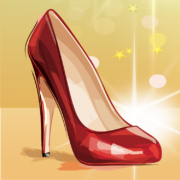


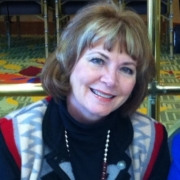 Happy Monday! I interrupt this blog to announce I have a book on sale! My award-winning Until Dead: A Cold Case Suspense is discounted to $.99 through April 15, 2024. Haven’t read it yet? The sale is available on the following digital outlets: Kindle, Nook, Kobo, Apple and Google Books. The following link will detail more about the book and take you to your choice of platform.
Happy Monday! I interrupt this blog to announce I have a book on sale! My award-winning Until Dead: A Cold Case Suspense is discounted to $.99 through April 15, 2024. Haven’t read it yet? The sale is available on the following digital outlets: Kindle, Nook, Kobo, Apple and Google Books. The following link will detail more about the book and take you to your choice of platform. 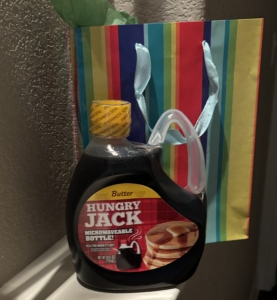 Why you may ask? Les likes his syrup hot; she obviously noticed the misshapen syrup bottles in our pantry.
Why you may ask? Les likes his syrup hot; she obviously noticed the misshapen syrup bottles in our pantry.

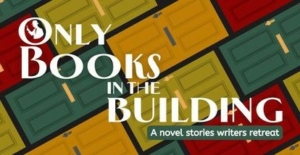
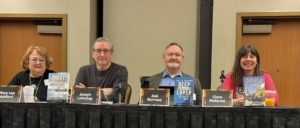
 The location was wonderful and we lucked out in terms of weather. So we were also able to enjoy the lake, the trails, and ultimately a bonfire.
The location was wonderful and we lucked out in terms of weather. So we were also able to enjoy the lake, the trails, and ultimately a bonfire.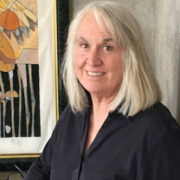 Hello to The Stiletto Gang members and readers! I never saw myself joining a gang, but here goes! My first blog shares an important aspect of my life outside of writing. I look forward to connecting with you! ~ Author Brooke Terpening
Hello to The Stiletto Gang members and readers! I never saw myself joining a gang, but here goes! My first blog shares an important aspect of my life outside of writing. I look forward to connecting with you! ~ Author Brooke Terpening